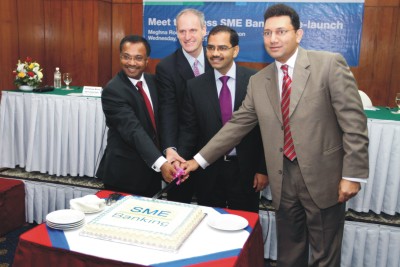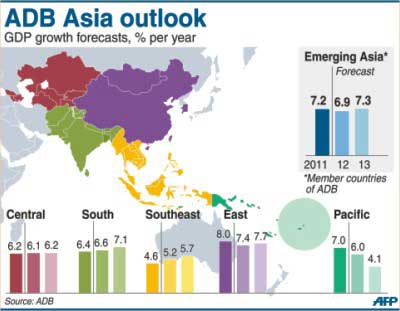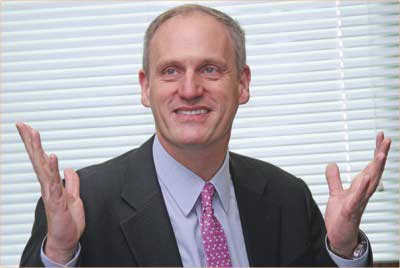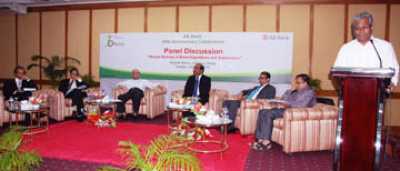Banking
StanChart to disburse Tk 957cr SME loans The bank re-launches SME banking
 From left, Sandeep Bose, head of consumer banking for Bangladesh, Nepal and Sri Lanka of Standard Chartered Bank; Christopher Dalo, global head of sales management and customer offerings (SME banking); Rajeev Chalisgaonkar, GM (SME banking) for South Asia, and Hassan O Rashid, GM (SME banking) for Bangladesh, cut a cake to re-launch the Bank's SME banking in Bangladesh at a press meet at Sonargaon Hotel yesterday.
From left, Sandeep Bose, head of consumer banking for Bangladesh, Nepal and Sri Lanka of Standard Chartered Bank; Christopher Dalo, global head of sales management and customer offerings (SME banking); Rajeev Chalisgaonkar, GM (SME banking) for South Asia, and Hassan O Rashid, GM (SME banking) for Bangladesh, cut a cake to re-launch the Bank's SME banking in Bangladesh at a press meet at Sonargaon Hotel yesterday.
Standard Chartered Bank plans to disburse Tk 957 crore in 2012 for the fast growing small and medium enterprises in Bangladesh, said a top official of the Bank yesterday.
The bank disbursed around Tk 1,000 crore in the SME segment in the last two years, said Hassan O Rashid, general manager for SME banking of Standard Chartered Bank, Bangladesh.
He spoke at the re-launch of the Bank's SME banking service in the country at a press briefing at Sonargaon Hotel in the city.
The London-based Bank has redesigned its SME products in line with the changing needs of the customers in Bangladesh, Rashid said.
“This latest strategy is underpinned by its investments in infrastructure, people and solutions,” Rashid said. “SMEs can now access comprehensive and tailored solutions that traditionally have been limited to multinational companies and large corporations.”
He said an SME customer will get tailor-made services under the new product proposition.
“We will deliver holistic solutions in cash management, trade finance, lending, foreign exchange hedging and investments,” said Rashid.
SME customers in Bangladesh now have a dedicated contact centre to access their accounts round-the-clock and interactive online banking platform, Straight2Bank.
“Our financial solution coupled with growing expertise in this segment is helping us to position the Bank as one of the leading financiers of SMEs in Bangladesh,” Rashid said.
Rashid said a customer can borrow upto Tk 1 crore in SME categories with providing small collateral worth Tk 30 lakh.
To get SME loans, business enterprises should fulfil a number of criteria, including three years of business experience, trade licence and relations with the Bank, he said.
Rashid said the Bank offers SME loans in different sectors, including manufacturing, trading and service, with an interest rate ranging from 15.5 percent to 19 percent.
At the programme, Sandeep Bose, head of consumer banking of the Bank's operations in Bangladesh, Nepal and Sri Lanka, said they do not see any uneven competition with the approval of new private banks in the country.
“Banking penetration rate is still very low in the country, which is less than 8 percent of the total population, he said. “So, there are a lot of opportunities in banking business in the country.”
Bose said the market will determine the nature of competition automatically.
On high interest rates, he said a Bank fixes an interest rate by considering a number of factors such as customer risk, deposit rate and inflation rate.
He said the Bank's 19 percent lending rate is reasonable as other banks in the country collect deposits at a rate of 12.5 percent.
Christopher Dalo, StanChart's global head of sales management and customer offerings (SME banking), and Rajeev Chalisgaonkar, general manager (SME banking) for South Asia, also spoke.
The Daily Star/Bangladesh/ 12th April 2012
Asia to maintain growth despite global crisis: ADB

Emerging Asian economies will experience flat growth this year before recovering in 2013, the Asian Development Bank (ADB) said in a regional report released Wednesday.
The Asian Development Outlook report for 2012 said the region was shifting toward a "more sustainable long-run growth path" based on strong domestic demand instead of exports, which have been hit by wobbly Western demand.
But the study also warned that the region's rising wealth was fuelling inequality and income disparities, with the underprivileged at risk of being sucked into a "vicious circle" of poverty and neglect.
The vast region's gross domestic product (GDP) growth will "cool somewhat" to 6.9 percent in 2012, down from 7.2 percent last year, before edging higher again to 7.3 percent in 2013.
"Despite the weak global environment, developing Asia's growth momentum continues," it said.
"Strong domestic demand provided necessary support in 2011, and this will need to continue in light of the soft export demand expected from the major industrial economies of the United States (US), eurozone, and Japan."
Even with a slowdown this year, developing Asian economies would easily outshine Europe, the United States and Japan where output is forecast to grow only 1.1 percent this year and 1.7 percent in 2013, the report said.
"Continued uncertainties in the eurozone and a further slump in global trade pose the biggest threats to the growth outlook," ADB Chief Economist Changyong Rhee said in a statement.
"At the same time, Asian economies are gradually diversifying into new markets, private consumption is trending up and the region has limited direct financial exposure to the eurozone -- which should help sustain its momentum."
The stronger trend in domestic consumption -- in a group of countries known for high savings rates -- could be seen in the region's current account surplus, which fell to 2.6 percent of GDP from four percent in 2010.
The report covers most economies in Asia except Hong Kong, Japan, Singapore, South Korea and Taiwan. The countries account for more than 80 percent of Asia's population.
Inflation was a concern for the region last year until the eurozone debt crisis and the patchy recovery in the United States sapped demand for exports, forcing policy-makers to worry more about growth.
The ADB said prices had eased but remained a "potential threat", especially given the volatility of food and fuel costs.
China, the world's second biggest economy, would see growth moderate to 8.5 percent this year and 8.7 percent in 2013, compared with 9.2 percent in 2011.
The region's other emerging giant, India, would post 7.5 percent growth in 2012.
Southeast Asia's GDP would expand 5.2 percent this year from just 4.6 percent in 2011, thanks largely to Thailand's recovery from last year's devastating floods.
The report said Asia had "lifted people out of poverty at an unprecedented rate" over the past few decades, but its recent growth had been characterised by widening income disparities between the super-rich and the rest.
If the spoils of growth had been more evenly shared and inequality rates had remained stable, another 240 million people -- or 6.5 percent of developing Asia's population -- would have moved out of poverty between 1990 to 2010.
Rhee said rising inequality is a concern for Asia -- cited as a successful example of high growth with low inequality in the 1970s -- as many African and Latin American countries have witnessed a decline in such divide.
"What we are worrying about is that if this trend continues Asia may lose one of our strong points," he told reporters in Hong Kong.
"Rising inequality can weaken the basis of growth by undermining social cohesion -- you can think of the Arab Spring -- and worsen the quality of governance," he warned.
The ADB recommended measures including greater spending on health and education, cutting fuel subsidies and broadening the sources of tax revenues to address rising inequality.
The Daily Star/Bangladesh/ 12th April 2012
StanChart to widen SME reach Top official explains why Bangladesh market is important for them
 Christopher Dalo
Christopher Dalo
Standard Chartered Bank has decided to focus more on small and medium enterprises in Bangladesh amid growing demand for funds from its clients, said a senior official of the global banking giant.
“We have already strengthened our SME banking offerings to meet the changing needs of the fast-growing SMEs in Bangladesh,” said Christopher Dalo, global head of sales management and customer offerings (SME banking) of the Bank.
The London-based Bank has redesigned its focus on the SME banking globally as the segment has grown at almost twice the rate of GDP in most markets and is expected to grow by up to 12 percent in a year across its footprint in Asia, Africa and the Middle East.
Dalo sat with The Daily Star for an interview in Dhaka yesterday.
The official said the needs of the SMEs are changing in Bangladesh due to the expansion of their businesses.
“Earlier, the SMEs used to operate their businesses targeting only the local customers, but now they are selling products to overseas markets and importing goods,” said Dalo.
As a result, they are getting busier and their needs are changing, he added.
“We have to change our product offerings and solutions since the needs of the SMEs are changing,” said Dalo who holds a Bachelor's and a Master's degree in industrial engineering from the University of Massachusetts, USA.
In line with the changing needs of the SMEs, the Bank will offer the tailor-made services exclusively for the segment, focusing on simplicity.
“We will provide these products and solutions to the SME segment that will help them satisfy their comprehensive needs,” said Dalo
He said the small and medium businesses generally need banking support for their working capital, business expansion, business protection and yield enhancement.
The new product proposition will serve these needs, said Dalo. “Customers' needs are not just lending needs, rather they want more.”
The official said they want to expand their offers for the SMEs as Bangladesh is one of their important markets among the emerging countries.
"It is an important and growing market. It has grown tremendously. We see it to grow even more," said Dalo.
The Bank, which is especially focused on Africa, Asia and the Middle East, launched SME banking in Bangladesh in 2004.
“In the segment, we have a good track record since the beginning of the SME operations here,” he added.
In Bangladesh, there are about 60 lakh SMEs and micro-enterprises, according to Asian Development Bank, making up 75 percent of the domestic economy.
The sector accounts for about 45 percent of manufacturing value addition, 80 percent of industrial employment, 90 percent of total industrial units and 25 percent of the total labour force.
Their total contribution to export earnings ranges from 75 percent to 80 percent, according to an ADB survey.
"We do business in about 30 markets. Bangladesh is clearly among the top ten. We see here good growth," said Dalo who joined the Bank in 2010 and is now based in Singapore.
Their goal is to become the priority bank of the customers, said Dalo.
"Our ambition is to be the leading international bank for SMEs, building the segment into a multi-billion-dollar business over the next two to three years."
However, Dalo said the SME sector also carries some risks.
"Risk management is important. One of the challenges is a lack of access to financial data of many small enterprises and their business health."
The Daily Star/Bangladesh/ 12th April 2012
Economy to take hit from global headwinds: ADB The agency says GDP may slow to 6.2pc this fiscal year, 6pc next
 Bangladesh's economic growth may slow in two back-to-back years due to falling exports and a hike in interest rates, the Asian Development Bank (ADB) said yesterday.
Bangladesh's economic growth may slow in two back-to-back years due to falling exports and a hike in interest rates, the Asian Development Bank (ADB) said yesterday.
The ADB projected the country's GDP growth at 6.2 percent for fiscal 2012, down from 6.7 percent a year ago. The government, however, expects this fiscal year's GDP to be 7 percent.
In the Asian Development Outlook released throughout the Asia-Pacific region, the ADB also said GDP would further slip to 6 percent in the next fiscal year.
The forecast comes in line with other Asian economies that will experience flat growth this year before recovering in 2013.
The GDP growth this fiscal year is expected to slow with a slowdown in exports -- the country's main growth driver -- as the year progresses, ADB Country Director Teresa Kho told reporters in Dhaka yesterday.
In the next fiscal year, the growth will further decrease as interest rates are raised to bring down inflation and export growth is slowing further, ADB Senior Country Economist Zahid Hossain said in his presentation on the economy.
Kho said the external economic environment for the developing countries, including Bangladesh, remains unfavourable as the eurozone fell into a prolonged period of debt adjustments, and the US recovery still remains weak.
She also said domestic demand has also weakened with rising interest rates, following the adoption of credit tightening measures to rein in inflation.
Industrial growth will be lower because of the weakening in domestic and external demand conditions, Kho said, adding that agriculture growth will slow mainly because of the high base in the previous year.
Citing a number of risks to the economy, Kho said macroeconomic management, however, began to come under pressure, as the current fiscal year unfolded. Inflation rose rapidly.
Kho said the balance of payments came under strain from higher oil imports for power generation, in the face of weakened exports.
Reserves fell and the taka depreciated significantly, she said, adding that the external current account is expected to move into a deficit, the first time in more than half a decade.
“Fiscal pressures were also built up because of rising subsidies on fuel and electricity,” she said. To finance the subsidies, the government had to borrow heavily from the banking system, as foreign assistance declined and revenue growth was slower than in the previous year, she added.
Kho also said project implementation continues as a weak area, as evidenced by the recent cut in the annual development programme.
Bangladesh needs to reduce its growing fiscal and external imbalances and cut subsidies by adjusting fuel and electricity prices, she said.
The senior country economist said the country needs to create space for more-acutely needed-outlays on infrastructure and human development, and reduce the budget's excessive domestic borrowing.
Hossain said the business climate needs to be substantially improved, to scale up private investment, including foreign direct investment.
To mobilise resources for closing the large infrastructure gaps, greater private participation in infrastructure development, including public-private partnership, is needed, Hossain said.
Bangladesh has several strategic advantages, including low-cost labour and location in a fast-growing region, which can help attract large FDI into light industry, he said.
In several Asian countries, labour costs are fast rising, opening up prospects for foreign investors to relocate investment to Bangladesh, he said.
To attract greater FDI flows, it is essential to remove infrastructure bottlenecks, make land more readily available, upgrade skills of the labour force and remove administrative delays and impediments, he said.
The Daily Star/Bangladesh/ 12th April 2012
AB Bank Limited on the eve of its 30 years anniversary organized
 AB Bank Limited on the eve of its 30 years anniversary organized a round table discussion titled "Recent Reforms in Bank Regulation and Supervision" in the city Tuesday.Minister for Primary and Mass Education Dr. Md. Afsarul Ameen was the chief guest on the occasion. Key note speaker was Mr. S. K. Sur Chowdhury, Deputy Governor, Bangladesh Bank.K. Ibrahim Khaled, Chairman, Bangladesh Krishi Bank, Dr. Ahasan Mansur, Executive Director, Policy Research Institute of Bangladesh, Dr. Mohammed Helal, Asst. Professor, Dept. of Economics, University of Dhaka and Ali Reza Iftekhar, MD & CEO, Eastern Bank Limited. M Wahidul Haque, Chairman along with M. Fazlur Rahman, President & Managing Director of AB Bank Limited attended.
AB Bank Limited on the eve of its 30 years anniversary organized a round table discussion titled "Recent Reforms in Bank Regulation and Supervision" in the city Tuesday.Minister for Primary and Mass Education Dr. Md. Afsarul Ameen was the chief guest on the occasion. Key note speaker was Mr. S. K. Sur Chowdhury, Deputy Governor, Bangladesh Bank.K. Ibrahim Khaled, Chairman, Bangladesh Krishi Bank, Dr. Ahasan Mansur, Executive Director, Policy Research Institute of Bangladesh, Dr. Mohammed Helal, Asst. Professor, Dept. of Economics, University of Dhaka and Ali Reza Iftekhar, MD & CEO, Eastern Bank Limited. M Wahidul Haque, Chairman along with M. Fazlur Rahman, President & Managing Director of AB Bank Limited attended.
Financial Express/Bangladesh/ 11th April 2012



